Not that you have to be there; books are a uniquely portable magic.
—Stephen King, On Writing
When I was a kid, our car and mobile home smelled like Winston cigarette smoke, and—by osmosis—so did I. My mom loved to smoke, and most of her friends shared her passion for the game, especially Uncle Smokey. Uncle Smokey wasn’t my uncle by blood or marriage, just a close family friend who wore a black captain’s hat, drove a Harley-Davidson cruiser, and called me Timothy J. as though I had one of those southern double names. For my mom, Uncle Smokey, and their friends, cigarettes were the smartphones of the day. Everyone had to have one, whether it was good for them or not. So I lived my childhood in a cloud of smoke, and much like a fish doesn’t know it’s wet until it’s not, I didn’t know I stank until I didn’t.
Here in Montana, the Big Sky sun has broiled my body’s veneer of sunscreen, sweat, river water, and mud into a funk that could run a pig off a manure wagon. Even Mom and Uncle Smokey would raise a brow at this achievement. But no one in the fly shop complains. They, too, are fly anglers, and like me, they just want to hang out with like-minded people and buy some things they may or may not need. I settle on a half-dozen flies and a retractor gadget to keep my other gadgets and gizmos from getting away. When I pay the kid behind the counter, I submit to the stench and ask for directions to the nearest truck stop with a shower.
The kid’s answer is Montana’s version of New England’s “You can’t get there from here.” So I drive south to Helena and then west toward Missoula. At a travel plaza a few miles before Missoula, I give ten dollars to a lady with tangerine hair, a missing tooth, and a distinctive scar under her left eye. In return, she hands me two avocado-colored towels, a matching washcloth, and a key to room number two. It’s a practical room with a sink, a toilet, and a shower, all clean enough to ease my worries about not wearing the cheap flip-flops Roxanne said would keep my feet from becoming athletic. Fifteen minutes later, I’m back at the truck, and—like the label on the body-wash bottle promised—I smell like a Caribbean island vacation. But the inside of the Suburban does not. The once-sweet smell of adhesive, fabric, and plastic that saturated the cab when I first drove off the Chevrolet lot is gone. In its place is a remnant of the crud I just scrubbed from my body, plus something I might blame on my dog if he were here. But despite all that, I smell the books.
I have a box of books on the floorboard behind the driver’s console, next to the place I lay my head at night to sleep. Anyone on a trip like this should have one of these boxes. In mine, I have The Longest Silence by Tom McGuane, Angling Days by Bob DeMott, Trout Madness and Trout Magic by John Voelker, A Place on the Water and The River Home by Jerry Dennis, and every book Jerry Kustich wrote about his life in Montana.
I first read Tom McGuane’s book nearly twenty years ago on a backwoods Upper Peninsula fishing trip. Huddled in the back of my truck with a battery-powered light flooding the pages, I learned that McGuane’s voice was everything but silent:
I’m afraid the best angling is always a respite from burden. Good anglers should lead useful lives, and useful lives are marked by struggle, and difficulty, and even pain. Perhaps the agony of simple mortality should be enough. But probably it is not. As they say in South America, everyone knows that they are going to die; yet nobody believes it. Human lapses of this kind enable us to fish, fornicate, overeat, and bet on horses.
I had never bet on horses—and still haven’t—but I had varying degrees of familiarity with the other pastimes. I felt like McGuane knew me or, at least, knew who I wanted to be. His fishing stories were the kind I’d come to prefer: fishing stories that weren’t really about fishing.
When I reread that book now, the deckle-edged pages and powerful prose remind me of a time when I hoped—as it had for McGuane—fly fishing could become my way of looking at the world. I was at a stage somewhere between neophyte and whatever place I’m in now. I could tell the difference between a mayfly and a caddis, I knew 6X tippet was finer than 4X, and I had caught several fish on a dry fly I had tied on my own. But every large trout I would catch and every memorable cast I would make were still in front of me then. Like most of us, I hope and believe many more notable fish and casts will come. But those fly-fishing firsts—much like a first date, a first kiss, and a first love—only come once, and we need to keep reminders of that pre-first excitement in our box.
I’ve read John Voelker’s books more times than Yogi Berra is said to have said something he didn’t say. I’ve internalized the yarns to the point I often tell the stories as though they’ve happened to me. And in some manner, I suppose they have. I might not read from either book during this trip, but both are first editions, and they are most responsible for the sweet smell of vanilla emanating from the box. Testament of a Fisherman—the prelude in Trout Magic—is the type of prose a person might have chiseled onto their gravestone. With 207 words that start with I fish because I love to, and end with I suspect that so many of the concerns of men are equally unimportant—and not nearly so much fun, Voelker made answering the “Why do we fish?” question as difficult for any writer who came after him as Patsy Cline made singing “Crazy” for any singer who came after her.
I bought Jerry Dennis’s book, A Place on the Water, on May 9, 1995, at Snowbound Books in Marquette, Michigan. Four days before that, I attended a dinner for the honor-society students in our electrical engineering department at Michigan Tech. George Swenson Jr.—a University of Illinois professor whose father founded our department—spoke to our group. At seventy-two years of age and largely overlooked by the balding gene, Professor Swenson stood at the podium with the slight bend of a man who had ducked through doorways for most of his life. He repeatedly ran one hand through his thick white hair as he told us about building an impromptu antenna to record the first transmissions from the Soviet satellite Sputnik. I remember details of that night partly because of those recordings’ historical significance and partly because of the flair with which Professor Swenson told his story. But mostly, I remember that night because of the phone call.
Roxanne and our children were at a Cinco de Mayo party with friends in Houghton’s twin city of Hancock, where I would be if I were not our speaker’s host at the dinner. So when the server interrupted Professor Swenson to announce a call for me, I expected to hear Roxanne tell me one of our kids had sprained a joint or broken a bone at the party. Instead, an unexpected voice said I should come to the hospital. Something was wrong with Roxanne.
I returned to the presentation room, apologized to Professor Swenson, and told him I needed to go to the hospital. My colleague and good friend Warren—who must have noticed my face was the color of Professor Swenson’s hair—insisted on driving. When we got to the hospital, the doctor said Roxanne had had a stroke, and they needed to move her to the regional center in Marquette. A man named Roxy told me he would drive the ambulance fast, and under no circumstance should I try to keep up with him. Warren said he’d make sure I got there safely.
We stopped once for gas and coffee and to take a pee. A guy in the store smelled just like Uncle Smokey, and when he bought a pint of Wild Turkey and two packs of Marlboros, I got mad. Why wasn’t this guy in an ambulance instead of Roxanne? When I got outside the store, I screamed with all the strength my diaphragm could supply. Warren let me finish, then grabbed my arm and said, “Come on, we have to go.” The drive to Marquette takes a little under two hours, and I suppose that’s how long it took that night, but I don’t remember much about it. Warren was in the middle of a personal and painful divorce, and I was at the beginning of something neither of us understood. He drove, and I watched the trees appear and disappear in the tunnel of light before us.
In the candid and sometimes circular way doctors talk, the neurologist said there wasn’t much he could say. Roxanne could have a near-perfect recovery, or she could have another stroke that night and die. There was no way to know. A seemingly endless stream of people in white jackets came into the room, shining lights in her eyes and poking her left foot and hand with dull needles. I watched it all from a small chair in the corner. And as believers and nonbelievers do in times like these—I told God I was ready to make any deal it would take to fix whatever was wrong. An hour or two later, a nurse took me to another room to sleep on a cot. Warren was already there.
Warren stayed for two days but then needed to get back to Houghton. I went with him to get my truck, or someone brought it to me. I just don’t remember. On Tuesday, I went to a local bookstore to find something to read. A Place on the Water was on the “of local interest” rack. On the back of the book, people like Nick Lyons and John Gierach said it was an excellent book by a superb writer. That sounded good and would have meant a lot more if I had known who those guys were at that time. The author’s biography said Jerry Dennis lived in northern Michigan with his wife and two sons. In the table of contents, I saw that one of the essays was called “A Big Two-Hearted Pilgrimage,” in reference to the only story about fishing in the Upper Peninsula I had read at that time.
I sat beside Roxanne’s bed and read Jerry’s book. Amazing, the way the world grows smaller as we grow older, he began the first sentence. I clench my eyes tightly and row, he ended the last. In between, he told me about fathers and sons, boys and fish, kindness and empathy, love and desire, hope and strength, search and discovery. He showed me a young man’s love for the outdoors, his family, and the beautiful, kind woman he adored. He described a life of wonder in Michigan’s Upper Peninsula. A life that Roxanne and I had moved here three years before to build for ourselves. A life I now desperately hoped we could still have ...
Editor's note: "Uniquely portable magic" is an excerpt from the book, A Cast Away in Montana, from longtime and frequent Hatch Magazine contributor Tim Schulz. The book is available through Amazon and wherever books are sold. To order a signed copy by the author and painter Bob White, whose artwork graces A Cast Away in Montana, visit Bob White Studio.








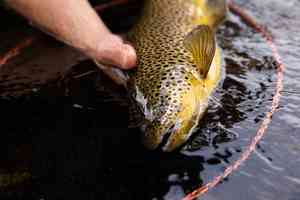





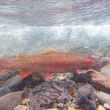
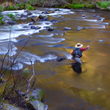



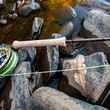
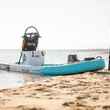



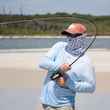





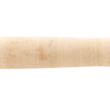
Comments
Dave Christensen replied on Permalink
A Castaway in Montana is one of the best books I've read in the last 20 years! Putting in an order for Robert's Yellow Drake Parachute immediately!
Pages